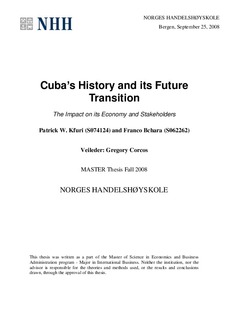| dc.description.abstract | The purpose of this paper is to analyze Cuba from both a historical and current perspective, and based on these analyses, breakdown the key stakeholders and their respective positions towards change. Due to the complicated nature of this topic, there are quite a few things that must be considered before a true analysis can be undertaken. Considering the controversies surrounding the Fidel Castro regime, as well as the United States’ policy towards the regime, it is difficult to find objective research materials. Throughout the writing of this paper, a conscience effort was made to remove the subjectivity from the various research sources, and in essence to consider both sides of the equation. Additionally, considering the recent changes within the Castro regime, namely the appointment of Raul Castro as the head of Cuba, and the stepping down of Fidel, his older brother, there has been much debate whether any true changes have been made to both governmental and economic policies. That being said, for the purposes of this paper, the political succession of Raul, is not considered to be significant enough to warrant a separate analysis regarding the Castro regime. In other words, for all intents and purposes within this paper the Raul Castro regime will be considered the same as the Fidel Castro regime for simplicity reasons. Raul has made only very minor changes, and the few that he has made do not really affect the Cuban population in a significant way. Raul has now allowed the purchasing of DVDs and computers by the Cuban public; however, they are at such a high cost that virtually no one can afford them. He has also changed the hotel policies at the State-owned hotels, now allowing the average Cuban population to stay in these resorts. Again, considering the costs of such hotels, no average Cuban could even dream of staying at these resorts. These are the basis for the decision to consider the Raul and Fidel regimes as the same within the analyses of this paper.
7
Although there well be a brief section regarding some of Raul's changes, it will not be carried through to the full analysis of the Cuban public sentiments. Furthermore, it is the opinion of this paper that in order for a true transition to take place within Cuba, both Fidel and Raul must be gone. It will be interesting to see what happens following their departure, and whether the hypotheses of this paper are correct and a democratic Cuba will arise. | en |
